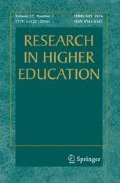Abstract
Filipino and American undergraduate students rated college instructor characteristics according to their perceived importance for effective teaching. Items were selected to reflect relevant value orientations in Filipino and American cultures. Factor analysis of the ratings revealed six underlying dimensions. MANOVA results showed that the group ratings on the six corresponding subscales were significantly different. Discriminant function analysis revealed that Filipino students rated items pertaining to authoritarianism and personal appearance of the instructor as significantly more important for effective teaching than did American students. This suggests that cross-cultural differences in perceptions of effective teaching may be predictable from a knowledge of both similar and conflicting value orientations in the specific cultures. Implications for the academic adjustment of students from different cultures were discussed.
Similar content being viewed by others
References
Bail, F. T., Dunn-Rankin, P., & Norton, R. E. Student evaluation of college teaching. Unpublished manuscript, 1975.
Bulatao, J. Personal preferences of Filipino students.Philippine Sociological Review 1963,2 168–178.
Cattell, R. B.Factor analysis. New York: Harper & Brothers, 1952.
Chunnual, N.Psycho-social adaptations of international exchange students in American university. Unpublished doctoral dissertation, University of Hawaii, 1976.
Cooley, W. W., & Lohnes, P. R.Multivariate procedures for the behavioral sciences. New York: Wiley, 1962.
Coombs, C. H.A theory of data. New York: Wiley, 1964.
Crittenden, K. S., & Norr, J. L. Student values and student evaluation: A problem in person perception.Sociometry 1973,36 143–151.
Cronbach, L. Coefficient alpha and the internal structure of tests.Psychometrika 1951,16 297–334.
Flores, P. M.Socio-psychological development of Filipino children. Manila, Philippines: P. M. Flores, 1969.
Guthrie, G., & Azores, F. Philippine interpersonal behavior patterns. In W. Bello and A. de Guzman (Eds.),Modernization: Its impact in the Philippines (IPC Papers No. 6). Quezon City, Philippines: Ateneo de Manila University Press, 1968.
Guthrie, G., & Jacobs, P. J.Child-rearing and personality development in the Philippines. University Park, Pa: The Pennsylvania State University Press, 1966.
Harris, R. J.A primer of multivariate statistics. New York: Academic, 1975.
Hildebrand, M., Wilson, R., & Dienst, E.Evaluating university teaching. Berkeley, Calif.: Center for Research and Development in Higher Education, 1971.
Homyen, D.Students' perception of the effective college teachers. Unpublished master's thesis, University of the Philippines, 1972.
Katz, J. Personality and interpersonal relations in the college classroom. In W. Sanford (Ed.),The American College. New York: Wiley, 1962.
Klenfield, J.Effective teachers of Indian and Eskimo high school students. Fairbanks: Center for Northern Educational Research, University of Alaska, 1972.
McKeachie, R., Lin, Y., Milholland, J., & Isaacson, R. Students' affiliations, motives, teacher warmth, and academic achievement.Journal of Personality and Social Psychology 1966,5 457–461.
Mendez, P. P., & Jocano, F. L.The Filipino family in its urban and rural orientation: Two case studies. Manila: Regal Printing, 1974.
Montenegro, X. Ideal and actual student perception of college instructors as predictors of teacher effectiveness. Unpublished doctoral dissertation, University of Hawaii, 1978.
Przeworski, A., & Teune, H. Equivalence in cross-cultural research.Public Opinion Quarterly 1966,30 34–43.
Rayder, N. F. College student ratings of instructors.Journal of Experimental Education 1968,37 76–81.
Solomon, D., Rosenberg, L., & Bezdek, W. E. Teacher behavior and student learning.Journal of Educational Psychology 1964,55 23–30.
Tang, K.The development and validation of an instrument to measure teaching effectiveness. Unpublished manuscript. Manila, Philippines: De La Salle College, 1973.
Tetembaum, T. J. The role of student needs and teacher orientation in student rating of teachers.American Educational Research Journal 1975,12 417–433.
Varias-de Guzman, J., & Varias, R. R.Psychology of Filipinos (rev. ed.). Manila, Philippines: J. Varias-de Guzman & R. R. Varias, 1967.
Author information
Authors and Affiliations
Rights and permissions
About this article
Cite this article
Bail, F.T., Mina, S.S. Filipino and American student perceptions of teacher effectiveness. Res High Educ 14, 135–145 (1981). https://doi.org/10.1007/BF00976290
Issue Date:
DOI: https://doi.org/10.1007/BF00976290




